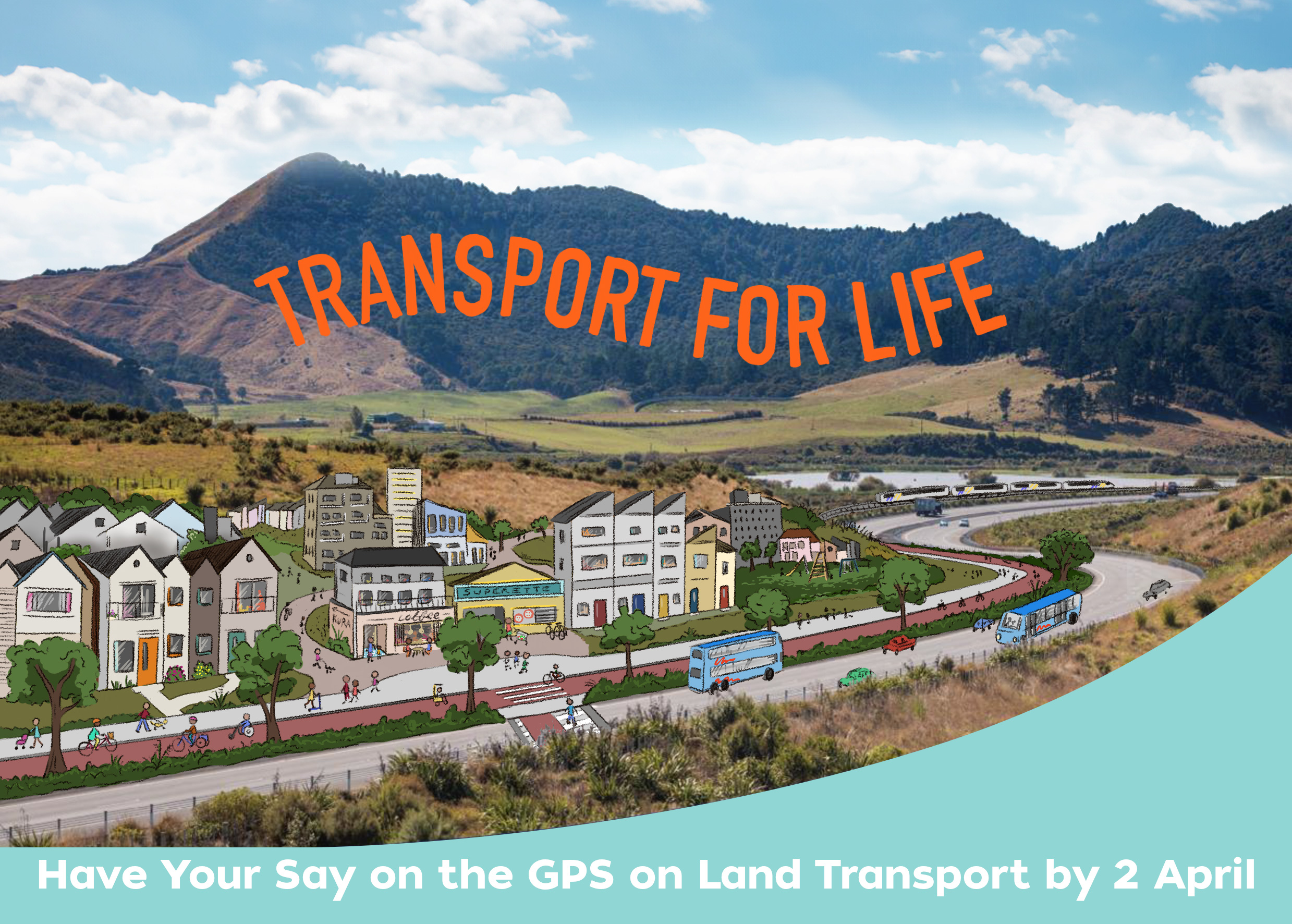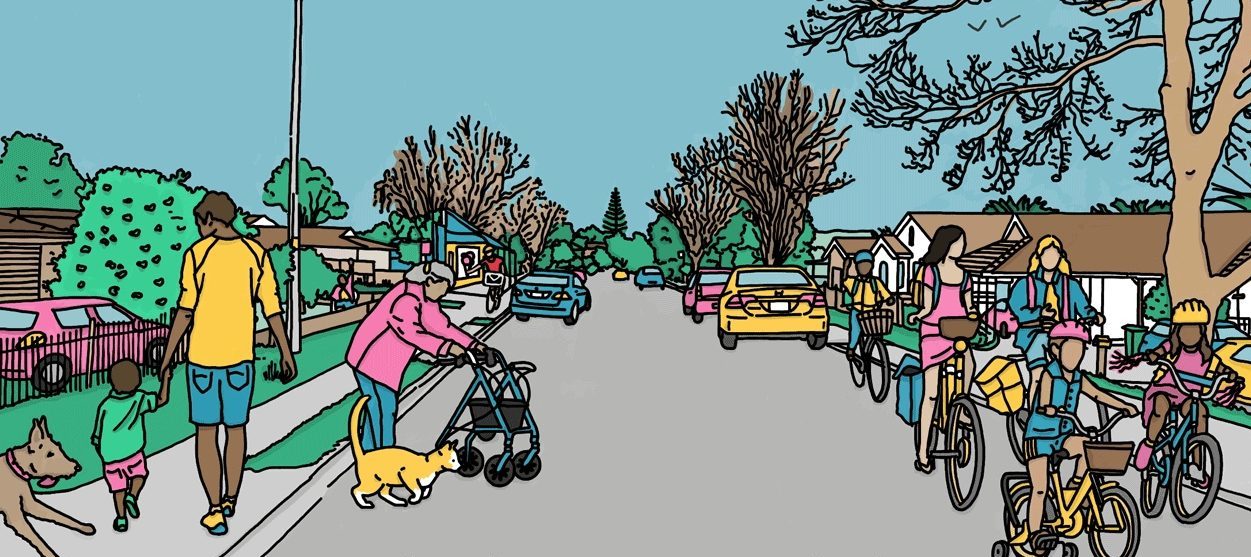The Government’s draft Government Policy Statement on Land Transport (GPS) is open for your feedback until 2 April at midday, 12pm. As we noted when it was first released, it has turned a blind eye to walking and cycling and forgoes the congestion, climate change and public health benefits that come with them.
What is a GPS? Isn’t that to do with navigation?
The Government Policy Statement on Land Transport, often shortened to GPS for convenience (but not to be confused with other Government Policy Statements!), is the Central Government’s high-level transport policy and 10 year budget. It sets out what kinds of transport projects it expects to see from Waka Kotahi NZTA across Aotearoa NZ, and what it wants to invest in – and therefore, what local Councils will be able to get central government funding for. Because a fair amount of our transport projects are co-funded by Waka Kotahi, this can have a big impact on what kinds of infrastructure we can build across our region.
“The United Nations recommends allocating 20 percent of national transport budgets to active modes to save lives, reverse pollution and reduce carbon emissions. Sadly, the government’s new transport policy statement ignores those benefits and commits less than three percent over its first three years.”
– Karen Hormann, Chair of Bike Auckland
This Government Policy Statement significantly reduces investment in walking, cycling, and public transport, while also increasing the costs of driving. It also intends to build roads which are as much as $24 billion dollars over budget.
And, it directs investment to only be made “where demonstrated volumes of pedestrians and cyclists already exist.” But as we know, if it’s not safe, very few people will cycle there. This direction does not take into account people’s desire to change how they get from A to B, and the latent demand for walking and cycling as a transport mode.
“You can’t justify a bridge by the number of people swimming across a river”
– Brent Toderian, City Planner, founder of Toderian Urban Works
We encourage you to make your voice heard on this important document. Remember to share with your friends and whānau to remind them to have their voices heard as well.
Feedback closes 2 April at midday, 12pm
Read on for some thoughts on “value for money” in our transport system
We all want to have a safe, reliable, and affordable way to get from A to B. But it’s obvious that our current transport network lacks safe and convenient options for walking, cycling, and using public transport, leaving many people with little choice but to drive for their trips.
It’s well known now that building more roads often exacerbates traffic problems. Some of the most effective ways to bust congestion, and make our roads more efficient, safe, and productive are to make it safe and convenient for people to walk, cycle, and use public transport. Giving people safe options will enable them to switch out of their cars if they want to, leaving more space on the road for the people who want or need to keep driving.
“But,” I hear you say, “we are in a cost of living crisis! We must be smart with our money!” Yes, exactly! We absolutely agree.
Investing in cycling saves us money as a society overall because cycling is healthy for our waterways, our airways, our minds, our bodies, and for our climate. It’s estimated that every kilometre cycled generates roughly three times as much net social benefit as driving the same distance costs society, and investing in cycling yields 10 – 25 dollars of benefits for each 1 dollar invested.
(As an aside, if we charged users for the true cost of their transport mode what would it look like? A great write up from Alex Dyer, Chair of Cycle Action Network, for your interest here.)
How do we best leverage the financial and social benefits of cycling? By getting more people on bikes! Waka Kotahi research found that 57% of Aucklanders identified feeling unsafe as a barrier to cycling more regularly. This highlights the need for more investment towards safe streets. Backing this up: we have abundant local proof of the ‘network effect‘; when a safe and connected cycle network is provided there is a rapid rise in the number of people cycling.
65.5% of everyday trips are less than 5km and this is a perfect distance for walking, cycling, and wheeling. Transport Minister Simeon Brown has the power to reduce congestion – and stress – by making it easy to take up people-powered transport for these local trips.
Relying heavily on cars for our transport doesn’t only cost society, it’s costing us individually too. Commuting into Tāmaki Makaurau CBD costs roughly 6 times more than taking public transport the same distance, when including parking and vehicle fixed costs. During a cost of living crisis, our government should be focusing on investing in options which enable people to reduce their transport costs overall.
Riding a bike for transport is an even more affordable option, and, depending on the trip, it can also be more reliable. It can sometimes even be faster than driving or taking the bus because we don’t get stuck in queues of motor traffic – we cruise past instead!
Perhaps this is why 69% of urban New Zealanders are supportive of cycling in their communities and 61% agree that investment in cycle infrastructure is important for providing transport options.
And yet, in this GPS, Minister for Transport Simeon Brown is raising the cost of driving, spending vastly more on transport overall while also reducing people’s options for getting from A to B. Increasing the cost of living for everyone while also reducing quality of life, as our streets become more and more jammed with noisy motor traffic!
“Building more highways while slashing investment in active modes simply locks in New Zealand’s existing car dependency.”
– Karen Hormann, Chair of Bike Auckland
We haven’t even mentioned how much it would cost us if we don’t meet our emissions targets – even though getting more people on bikes is one of our fastest ways to reduce transport emissions. On all fronts the evidence is clear; investing in walking, cycling and public transport would be the smartest financial move for the Central Government, and a great solution for efficiently reducing costs of living for us everyday kiwis, while delivering the best bang for buck for society overall.
Add your voice to the call for a revised Government Policy Statement on Land Transport which invests in providing affordable transport options and the quality of life that everyday kiwis want. And remember to share with your friends and whānau to remind them to have their voices heard as well.
Feedback closes 2 April at midday, 12pm




